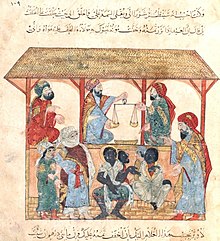| Part of a series on |
| Forced labour and slavery |
|---|
 |

Slavery in Yemen (Arabic: العبودية في اليمن) was formally abolished in the 1960s. However, it has been reported that enslavement still occurred in the 21st-century.
Chattel slavery in Yemen was abolished in two stages between 1962 and 1967. The 1962 revolution in Yemen lead to the abolition of slavery by the government in North Yemen, but slavery in South Yemen was not abolished until the socialist National Liberation Front (NFL) took power when the British left in 1967.[1]
Yemen is in Southwest Asia, and is a mostly Arab country. Yemen is considered a developing country, and has been in a state of political crisis since 2011. It was reported that at least 85,000 people were enslaved in Yemen in 2022, and due to the impossibility of conducting further surveys in the midst of the ongoing civil war, this number may be underestimated.[2] The Houthi movement have been accused of restoring slavery to Yemen.[3]
Not unlike previous times, slaves are inherited by their owners through family, as well as being bought and sold. The slaves are under complete control of their owners, an example of this being that although sometimes the slaves are allowed to marry one another, they are not allowed a ceremony, and are only allowed to see each other during an emergency or at night when their owner does not require them. In a sense, slavery has been formally recognised in Yemen, through a judge in the Courts confirming the transfer of a slave from one owner to another. This caused an outcry by the community and the media, which was allegedly quickly hushed up by the government.[4] Yemeni slave owners have admitted to selling slaves to countries such as Brazil and Saudi Arabia for significant amounts of money.[citation needed]
- ^ Miers, S. (2003). Slavery in the Twentieth Century: The Evolution of a Global Problem. Storbritannien: AltaMira Press. p. 352
- ^ "2022 Country Reports on Human Rights Practices: Yemen". United States Department of State. Retrieved 2023-12-26.
- ^ "Exclusive - Houthis Restore Slavery in Yemen".
- ^ Al Jazeera World. "Slavery in Yemen". Retrieved 27 November 2015.